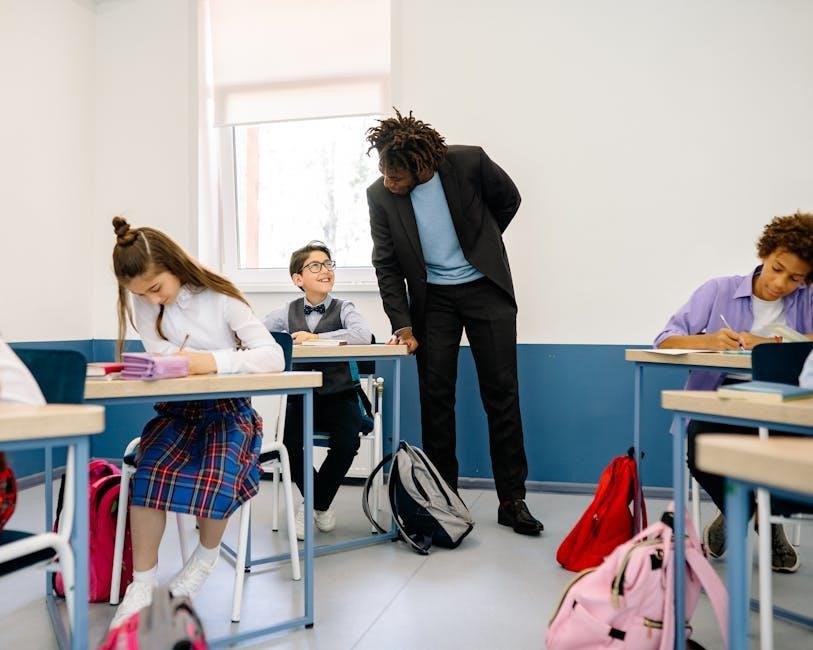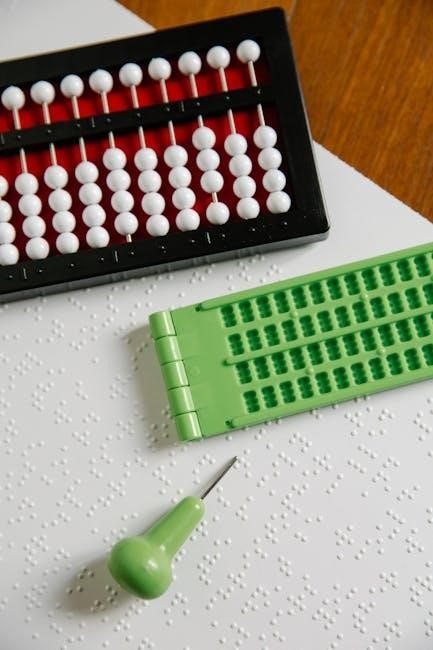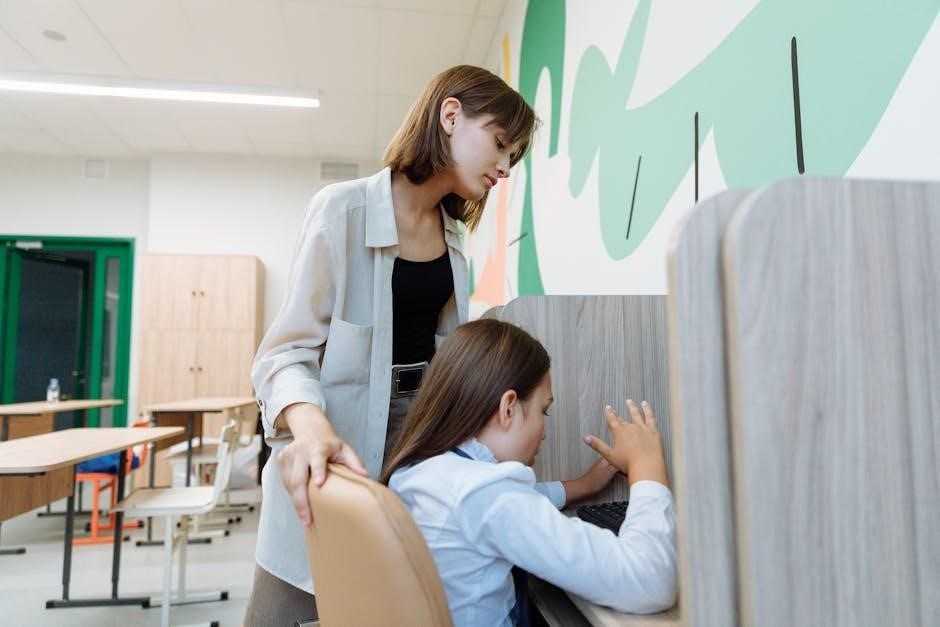Supports teachers in special education classrooms with instructional and administrative tasks. Assists in reinforcing instruction for individual or small groups‚ preparing materials‚ and maintaining a safe‚ organized learning environment for students with special needs.

Key Responsibilities
The primary role of an Instructional Assistant in Special Education involves providing essential support to teachers and students. This includes assisting in the implementation of instructional programs tailored to students with special needs‚ ensuring their learning environment is safe‚ caring‚ and inclusive. Key responsibilities encompass reinforcing lessons for individual students or small groups‚ helping prepare educational materials‚ and maintaining a well-organized classroom. Additionally‚ these assistants play a crucial role in behavioral support‚ helping students manage emotions and develop social skills. They also collaborate with other educational staff to ensure comprehensive support for students. Administrative tasks‚ such as record-keeping and clerical duties‚ are also part of their responsibilities. By fulfilling these duties‚ Instructional Assistants in Special Education contribute significantly to the educational and personal growth of students with diverse needs.
Assisting Teachers in Instructional Programs

Instructional Assistants in Special Education are integral to supporting teachers in delivering instructional programs. They assist in planning and executing lessons‚ often under the supervision of certified educators. This includes helping develop and implement Individualized Education Programs (IEPs)‚ which cater to each student’s unique needs. Assistants may lead small group activities‚ provide one-on-one support‚ and reinforce learning concepts to ensure students grasp the material. They also help in adapting general education curriculum to meet the specific requirements of special education students‚ ensuring inclusivity and accessibility. Additionally‚ they monitor student progress‚ communicate with teachers‚ and offer feedback to enhance instruction; By working closely with teachers‚ Instructional Assistants help create a structured and effective learning environment that promotes academic and personal development for all students.
Supporting Students with Special Needs
Instructional Assistants play a vital role in supporting students with special needs by providing personalized assistance tailored to their individual requirements. This includes helping students with physical‚ emotional‚ or cognitive challenges to participate fully in educational activities. Assistants often work one-on-one or in small groups to ensure students understand and complete assignments‚ reinforcing concepts taught by teachers. They also assist with daily living skills‚ such as organization‚ self-care‚ and social interactions‚ to promote independence. Additionally‚ Instructional Assistants help students navigate behavioral challenges by implementing positive reinforcement strategies and providing emotional support. They create a safe and inclusive environment‚ ensuring students feel valued and empowered to succeed. By addressing the diverse needs of special education students‚ Instructional Assistants contribute significantly to their academic and personal growth‚ fostering a sense of confidence and belonging in the classroom.

Preparing Instructional Materials
Preparing instructional materials is a key responsibility of an Instructional Assistant in special education. This involves developing and organizing resources‚ such as worksheets‚ visual aids‚ and adaptive tools‚ to support the curriculum and meet the diverse needs of students. Assistants often work closely with teachers to ensure materials align with lesson plans and Individualized Education Programs (IEPs). They may also adapt materials to make them accessible for students with varying abilities‚ such as enlarging text‚ creating tactile graphics‚ or translating content. Additionally‚ Instructional Assistants help gather and prepare supplies‚ set up workstations‚ and arrange classroom displays to create an engaging learning environment. Their efforts ensure that instructional resources are readily available‚ allowing teachers to focus on delivering instruction. By efficiently preparing materials‚ Instructional Assistants play a crucial role in facilitating effective teaching and learning in special education settings‚ ensuring students have the tools they need to succeed.

Maintaining Classroom Environment
Maintaining a well-organized and safe classroom environment is a critical duty of an Instructional Assistant in special education. This involves setting up work areas‚ arranging materials‚ and ensuring the space is conducive to learning. Assistants help organize supplies‚ decorate educational displays‚ and create a structured layout that promotes focus and accessibility for all students. They also play a key role in maintaining cleanliness and hygiene‚ sanitizing materials‚ and ensuring the classroom adheres to health and safety standards. Additionally‚ Instructional Assistants assist in managing student behavior‚ resolving minor conflicts‚ and ensuring a positive and respectful atmosphere. By maintaining order and organization‚ they help teachers deliver instruction more effectively and ensure students can engage fully in their learning activities. This support is essential for creating a stable and inclusive educational setting tailored to the needs of students with special needs.

Reinforcing Instruction for Individual or Small Groups
Instructional Assistants play a vital role in reinforcing instruction for individual students or small groups‚ particularly those with special needs. They work closely with teachers to deliver tailored lessons‚ ensuring students understand and retain the material. This may involve reviewing concepts‚ providing additional practice‚ or using visual aids to enhance comprehension. Assistants also adapt instruction to meet diverse learning styles‚ helping students who may need extra support or enrichment. By focusing on small groups or one-on-one interactions‚ they help students stay on track with their Individualized Education Programs (IEPs) and classroom goals. Additionally‚ Instructional Assistants provide positive reinforcement to build confidence and encourage active participation. This targeted support not only helps students grasp academic concepts but also fosters social and emotional growth. By reinforcing instruction in this way‚ Instructional Assistants play a key role in ensuring all students have the opportunity to succeed and reach their full potential.

Providing Behavioral Support
Instructional Assistants in special education are essential in providing behavioral support to students with diverse needs. They help create a structured and positive classroom environment by implementing behavior intervention plans and reinforcing appropriate behaviors. This includes monitoring students’ actions‚ redirecting negative behaviors‚ and teaching social skills. Assistants also assist in de-escalating conflicts and ensuring student safety during emotional crises. By maintaining consistent expectations and providing individualized support‚ they help students develop self-regulation and independence. Additionally‚ Instructional Assistants collaborate with teachers and other staff to document progress and adjust strategies as needed. This role is crucial in fostering a respectful and inclusive learning atmosphere‚ enabling students to focus on academics and social growth. Through proactive support and understanding‚ Instructional Assistants play a key role in helping students with behavioral challenges achieve their educational and personal goals.
Collaborating with Educational Staff

Collaboration with educational staff is a vital part of an Instructional Assistant’s role in special education. They work closely with teachers‚ special education managers‚ and other support staff to ensure a cohesive and effective learning environment. This includes participating in meetings to discuss student progress‚ develop individualized education programs (IEPs)‚ and share observations that inform instructional strategies. Instructional Assistants also assist in communicating with parents and guardians‚ providing updates on student behavior and academic performance. By maintaining open lines of communication and working as a team‚ they help ensure that students receive consistent and comprehensive support. Additionally‚ they may collaborate with specialists‚ such as speech therapists or counselors‚ to integrate therapies and interventions into daily routines. This teamwork ensures that all educational goals are aligned and that students receive the resources they need to succeed. Collaboration is essential for creating a unified approach to meeting the diverse needs of special education students.

Administrative and Clerical Tasks
Instructional Assistants in special education often handle various administrative and clerical tasks to support the smooth operation of the classroom and school. These duties may include preparing instructional materials‚ organizing files‚ and managing records related to student progress. They assist with tasks such as photocopying‚ filing‚ and distributing materials‚ ensuring that teachers have the resources needed for lessons. Additionally‚ they may help maintain student records‚ including updates on behavioral progress‚ academic achievements‚ and other relevant data. Clerical support also involves handling communications‚ such as sending emails or notes to parents‚ and assisting with scheduling appointments or meetings. These tasks allow teachers to focus more on instruction and student interaction. By managing administrative details‚ Instructional Assistants play a crucial role in maintaining an efficient and organized educational environment. Their contributions ensure that both teachers and students can concentrate on learning and growth‚ making administrative support a fundamental part of their responsibilities in special education settings.



